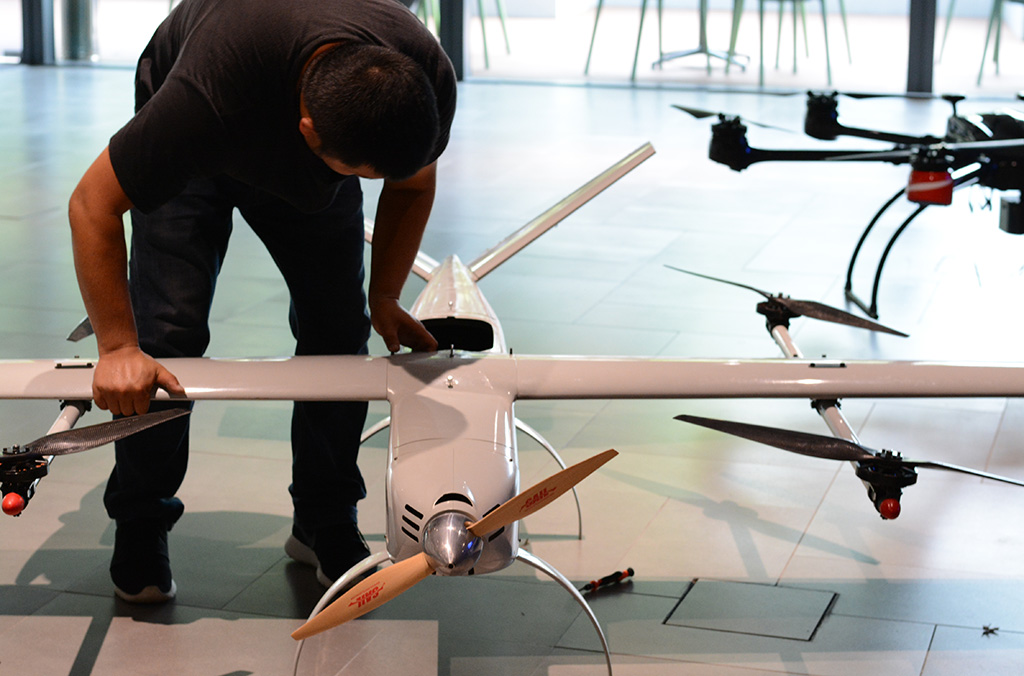Following the example of the US Department of Defense, Europol should coordinate European security research. In October, the EU interior ministers had decided on an “Innovation Laboratory” at the Police Agency. Due to potential confusion, the department will now be renamed.
Since 1984, the European Union has organised its civil security research in multi-annual framework programmes, the current programme is called “Horizon 2020”. Arms companies are involved in many of these projects; they are conducting research with institutes and authorities on drone tanks for border control, stopping “non-cooperative vehicles” with electromagnetic pulses or observing cities and borders by satellite. International agreements enable the involvement of third countries, for example Israel’s largest drone manufacturer has been involved in numerous projects for decades.
The participation of arms companies could soon be stepped up with new financial resources. So says a paper by Gilles de Kerchove, the Anti-Terrorism Coordinator of the European Union. He proposes that Europol should coordinate the civil-military research in the future. The police agency should act as an “Innovation Hub” for joint pilot projects. The model is the research unit of the US Department of Defense; Kerchove speaks of a “DARPA-type methodology”. The coordinator mentions the EU intelligence centre INTCEN as a partner of the new institution.
Administrative agreement with participating EU agencies
The EU interior ministers had already decided last October that Europol would play a key role in new technologies. At that time, there was still talk of an “Innovation Laboratory”. The renaming to “Innovation Hub” was necessary because similar departments of EU agencies like Frontex should not be confused with the new institution. These existing agencies with their own budgets for security research will in future be coordinated by the new centre at Europol.
According to Kerchove, the participating EU agencies could conclude an administrative agreement for joint research in the “Innovation Hub”. In this way, additional funds for individual projects are to be mobilised in addition to the funds from the EU research programmes.
Cooperation with Defence Agency and military “Cyber Academy”
Other participants in the research network include the European Union’s Joint Research Centre, the Agency for management of IT systems (eu-LISA) or the EU Police College CEPOL, as well as the EU Satellite Centre or the European Space Agency. The “Innovation Centre” is also to coordinate the so-called expert networks. This includes ENLETS, for example, which is preparing the use of new technology for the police.
Finally, the European Defence Agency will also participate in the “Innovation Hub”. The EU military have themselves decided on appropriate facilities within the framework of the “Permanent Structured Cooperation”, including an own “EU Cyber-Academy and Innovation Hub”.
“Next Big Data”, 6G and encryption
The paper of the anti-terrorism coordinator also mentions concrete projects of the “Innovation Centre”. Europol is to focus on so-called “disruptive technologies” which pose problems for police forces and secret services in the Member States. These include the introduction of 5G or preparation for 6G, “next Big Data”, artificial intelligence or weapons produced with 3D printers. Kerchove also mentions “predictive policing”, machine voice analysis, automated translation and processing of texts and block-chain technology.
While encryption needs to be strengthened for certain applications, Kerchove also wants to explore ways of intercepting encrypted communications. All the institutions and agencies involved could store their information in a common “data lake”, which would be processed using “artificial intelligence tools”. Kerchove intends to use the data, for example, to identify “radicalisation tipping points”.
Frontex as a “test laboratory”
Europol should also reach out to bodies outside the European Union. This includes the NATO Communication and Information Agency, which, like Europol, is partly based in The Hague. Another future partner is the Institute for Artificial Intelligence and Robotics in The Hague, a subdivision of the UN Institute for Crime Research.
According to another EU document, Frontex should serve as a “test laboratory” for new research projects. Europol and the border agency are to interlock with Interpol, which also operates an “Innovation Centre” in Singapore. The Interpol General Assembly decided in Chile in October to start negotiations with the EU on enhanced cooperation. Among other things, Interpol wants to expand the exchange of information with EU agencies.
Image: Europol should partner with the “Innovation Centre” at Interpol. Research there is being carried out, among other things, on the use of drones by the police, but also by terrorists (all rights reserved Interpol).





Leave a Reply